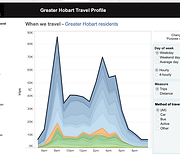

Menu
Recent projects and
collaborations
ACT Household Travel Survey analysis
The ACT and Queanbeyan Household Travel Survey was conducted in late 2022. Sift Research designed a public-facing data dashboard using Tableau software to summarise results. Statistical comparison reports - highlighting differences between the 2017 and 2022 surveys - were also developed.
Travel demand management reporting
This Australian Department of Infrastructure and Regional Development project considered the individual and cumulative impacts of travel demand management (TDM) techniques on the Melbourne road network. A combination of hypothetical pricing, network management and land use scenarios were explored. Sift Research supported the lead consultant AECOM by conducting background research on overseas TDM trials and authoring a comparative technical report on model outcomes.

Background research for the City of Melbourne Transport Plan
Sift Research produced a series of presentation-style reports that provided an evidence base to City of Melbourne staff in preparation for the Transport Strategy 2030. Data summarised from the Census and VISTA was used to examine the nature of trips to the city and surrounds. This included challenging long-standing assumptions, such as the origins of car travel causing peak hour congestion.
Greater Hobart Travel Profile
Sift Research provided the data analysis and dashboard design for the Greater Hobart Household Travel Profile.
Delivered in Tableau software, the project summarises the travel characteristics of Greater Hobart residents on an average day. Themes cover the how, why, where and when of travel, as well as more nuanced daytime population and household location summaries.
VITM Reference Case reporting
This 2018 study resulted in a clear and accessible description of the Victorian Integrated Transport Model (VITM) Reference Case, outlining long-term population, land use and infrastructure projections in a consolidated format. The project report provided a concise way for the modelling team to disseminate the underlying assumptions of the long term work program to a broader (non-technical) departmental audience.

Development of the South East Queensland Travel Survey
Sift Research supported the 'South East Queensland Travel Survey (SEQTS) Future Pathways Project' by providing background research on different data collection approaches and results. Case studies were developed for four distinct household travel survey methodologies: Computer-assisted personal interview; Online ‘Web-first’ self-completion survey; Smartphone app, with online validation of data; and Online Panel survey. For each method, implementation risks and issues were identified. Subsequent work stages delivered by Sift Research included development of fieldwork procedures for the preferred ‘web-first’ approach.




